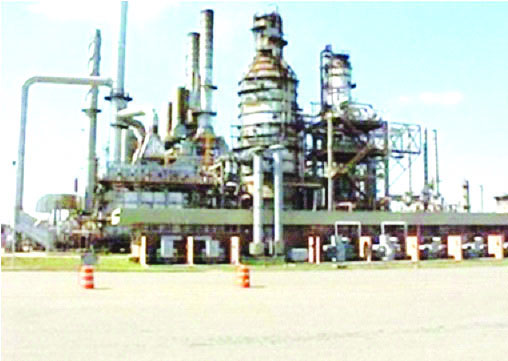P’Harcourt refinery won’t reduce petrol price, says PENGASSAN

The Petroleum and Natural Gas Senior Staff Association of Nigeria (PENGASSAN) has clarified that the expected reopening of the Port Harcourt refinery will not necessarily result in a reduction in petrol prices in Nigeria. Despite the optimism surrounding the rehabilitation of the refinery, PENGASSAN has raised concerns about the broader economic and logistical factors that need to be addressed before any significant changes can be expected in fuel pricing.
The Port Harcourt Refinery and Its Rehabilitation
The Port Harcourt refinery, one of Nigeria’s largest and most strategically important refineries, has been undergoing a major rehabilitation effort to restore its production capacity. The refinery, which has been plagued by years of underperformance and a lack of maintenance, has been a critical part of the government’s efforts to reduce the country’s reliance on imported refined petroleum products.
Nigeria, an oil-rich nation, has long struggled with its domestic refining capacity. The country depends heavily on imported refined fuel to meet local demand, which has been a major burden on the economy. The government’s rehabilitation of the Port Harcourt refinery is part of a broader strategy to revamp the country’s refineries and reduce reliance on imports, which is expected to improve local production capacity and create jobs.
However, PENGASSAN’s statement that the refinery’s reopening will not immediately lead to lower petrol prices highlights the complexity of the situation. Several issues need to be addressed before the refinery can have a substantial impact on the price of fuel in Nigeria.
Key Factors Affecting Fuel Prices
1. Limited Capacity and Output: While the rehabilitation of the Port Harcourt refinery will certainly increase local production, its capacity may still not be sufficient to meet Nigeria’s entire fuel needs. The refinery’s capacity, even after rehabilitation, may not be large enough to cover the full demand for petrol across the country, meaning that Nigeria will likely still rely on imported fuel for a significant portion of its consumption. Without the ability to produce enough refined fuel domestically, the benefits of reduced fuel importation and the associated cost savings may not be immediately realized.
2. Refinery Output and Demand: Even if the refinery produces more refined petrol, it may not be able to satisfy the full demand from all sectors of the economy, especially with population growth and increased fuel consumption. Thus, while the reopening of the refinery will ease some of the supply constraints, it may not result in a significant reduction in fuel prices, particularly if demand continues to outstrip the domestic supply.
3. Infrastructure Challenges: Nigeria’s fuel distribution network and infrastructure, including pipelines, storage facilities, and retail outlets, are often outdated and inefficient. A functioning refinery in Port Harcourt could still face significant logistical challenges in getting petrol from the refinery to various parts of the country in a cost-effective and timely manner. These infrastructure bottlenecks could further add to the cost of delivering fuel to consumers, thus limiting the potential impact of refinery reopening on reducing petrol prices.
4. Exchange Rate Volatility: Another critical factor influencing fuel prices in Nigeria is the exchange rate. The country’s dependence on imported refined fuel means that fluctuations in the value of the naira against major currencies, particularly the U.S. dollar, can drive up the cost of fuel. Even if local refineries ramp up production, the cost of importing raw materials and spare parts for refinery operations will be affected by the exchange rate, which can undermine efforts to lower fuel prices.
5. Government Subsidy and Pricing Mechanisms: In addition to production factors, Nigeria’s fuel pricing is heavily influenced by government policies, including fuel subsidies. The Nigerian government has long subsidized petrol prices to keep them artificially low, but this has put immense pressure on public finances. PENGASSAN’s statement also suggests that without a rethinking of the fuel subsidy regime, which continues to drain the national treasury, fuel prices may not decrease even with increased domestic production. The government’s approach to pricing fuel, including the removal or reduction of subsidies, will play a central role in determining future fuel price trends.
The Impact on Consumers and the Economy
Despite these challenges, the rehabilitation of the Port Harcourt refinery is a step in the right direction for Nigeria’s oil and gas sector. A fully functioning refinery could potentially lower the country’s reliance on imported fuel over time, reducing the trade deficit caused by fuel importation and creating job opportunities within the domestic oil and gas industry.
However, the fact that PENGASSAN has warned that petrol prices may not immediately decrease shows the complexity of the issues at hand. While the opening of the refinery is expected to improve domestic refining capacity and contribute to economic growth in the long term, the reality of reducing fuel prices is tied to addressing a wider range of economic and infrastructural challenges.
For Nigerian consumers, this means that any immediate relief in fuel costs is unlikely. Fuel prices will continue to be influenced by global oil prices, exchange rates, and the state of Nigeria’s refinery infrastructure. Additionally, as long as subsidies remain in place or fluctuate, the government’s role in regulating prices will continue to be a crucial factor.
The rehabilitation of the Port Harcourt refinery represents a crucial step toward improving Nigeria’s refining capacity and reducing its dependence on imported fuel. However, as PENGASSAN has pointed out, the reopening of the refinery alone is not enough to guarantee a reduction in petrol prices in the immediate future. A wide range of factors, including refinery capacity, infrastructure challenges, exchange rates, and government policies, will continue to influence fuel pricing in the country.
While the refinery’s reopening holds promise for long-term improvements in Nigeria’s energy sector, the realities of the country’s complex economic and energy landscape mean that consumers should not expect an immediate reduction in fuel prices. However, the project’s successful completion and the potential for increased local production could pave the way for a more sustainable and cost-effective fuel supply in the years to come.





Responses